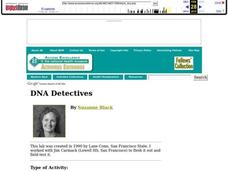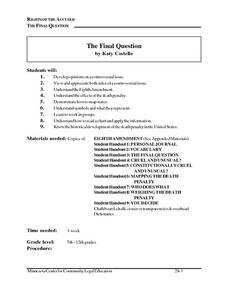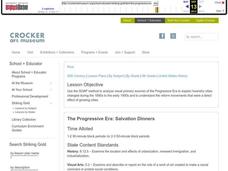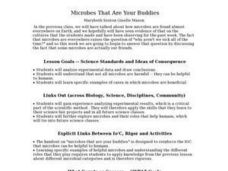American Statistical Association
Chunk it!
Chunking information helps you remember that information longer. A hands-on activity tests this theory by having learners collect and analyze their own data. Following their conclusions, they conduct randomization simulations to test...
Newseum
Slanted Facts and Slippery Numbers
The Internet is known as the information superhighway, but sometimes it's hard to know when to hit the brakes on unreliable sources. Using a well-rounded lesson plan, pupils read and summarize articles about the gender pay gap and...
Newseum
Decoding an Editorial Cartoon
What advantages do political cartoons have over written editorials? Scholars discuss the topic by exploring editorial cartoons. Working in small groups, pupils analyze an Uncle Sam cartoon and complete a worksheet. As a fun extension,...
Council for Economic Education
FRED and the Federal Budget Interactive Lesson
How can a federal debt accumulate over time? The Federal Reserve Economic Data (FRED) dashboard allows scholars to actively research each aspect of the federal budget. In pairs, they analyze economic data to determine the best way to...
Serendip
Using Models to Understand Cellular Respiration
Energize biologists with colorful images in an activity that captivates the imagination while demystifying the subject of cellular respiration. Participants build comprehension skills and access core content knowledge by analyzing text...
J. Paul Getty Trust
Exhibiting Common Threads
Artists working in different media often explore the same themes—to model how these same themes weave their way through different forms of artistic expression, scholars analyze images by Dorothea Lange, identifying key themes in her...
National Endowment for the Humanities
Women's Equality: Changing Attitudes And Beliefs
Students analyze archival materials contemporaneous with the birth of the Women's Rights Movement, and begin to appreciate the deeply entrenched opposition the early crusaders had to overcome. They discuss whether or not such attitudes...
Curated OER
DNA Detectives
In order to understand DNA fingerprinting, advanced biology aces divise a crime scenario and analyze three different samples of lambda DNA. This creative lesson plan provides practice with micropipettes, electrophoresis boxes, and other...
Curated OER
Linkages Between Surface Temperature and Tropospheric Ozone
High schoolers use data microsets of mean near-surface air temperature and tropospheric ozone residual averages to infer patterns. Students analyze changes in tropospheric ozone and then hypothesize about the consequences of these changes.
Curated OER
From Page to Stage
Students, utilizing video clips and Web sites, compare specific passages from original texts to moments in Broadway musicals on which they were based, analyzing similarities and differences between them. They adapt literature into a...
Curated OER
The New York School: Action and Abstraction
Students examine the influences and similarities between the New York School poets and Abstract Expressionist artists. They analyze paintings and poems, and write original poetry.
VH1
Lessons for Hight School Music Classes: Lesson 2
Art and music have been vehicles for statements of civil unrest for hundreds of years. Upper graders critically analyze several pop songs or music movements from the 1980s that exemplify politically charged motives. They analyze lyrics...
Curated OER
CAN WE SWITCH GENDERS OF STORY CHARACTERS?
Analyze characters and stories to identify stereotyping. Learners will examine the concept of character gender to evaluate bias in classroom story books. They are asked to read a story or play and change the gender of the character to...
Curated OER
The Final Question
Students analyze their own feelings about the death penalty before considering court cases involving the death penalty. They determine what their definition is of cruel and unusual punishment, and analyze how different states handle the...
Curated OER
The Food Pyramid
Learning about nutrition and how to eat healthy foods is very important for kids these days. Here is a lesson, designed for 4th graders, that teaches these important skills. Pupils plan nutritional meals by using the USDA's Food Guide...
Curated OER
The Progressive Era
Eighth graders utilize the SOAP method to analyze a work of art and relate it to what they know about the Progressive Era and the reasons why cities changed and the ways in which cities changed during the end of the 19th century. They...
Curated OER
Doctor DeSoto's Foxy Persuasion
Who is Doctor DeSoto? Start by playing a video clip (included). Discuss different methods of persuasion, and then analyze two different persuasive letter examples. What should your class be looking for? Send them off to work in groups...
Curated OER
Sunrise/Sunset
Third graders discovver what causes the dramatic colors of a sunset by seeing the changing color of light as it passes through a clear container of water to which milk is gradually added. They measure the liquids and observe what happens...
Curated OER
Microbes That Are Your Buddies - Biology Teaching Thesis
High schoolers analyze experimental data and draw conclusions. They are able to comprehend that not all microbes are harmful--they can be helpful to humans. Students are able to comprehend specific examples of cases in which microbes are...
Curated OER
Campaign Ad Critique
Students analyze current campaign TV ads and literature. They identify the ad by "type." They learn to look beyond the ad to understand its intended purposes and its real content.
Curated OER
Investigation of a Key Public Policy Issue
Twelfth graders select and analyze a public policy issue. In groups, they create a hot list of web sites that have been explored and investigated as a result of a web search. Using their research, 12th graders individually produce a...
Curated OER
Invetories Slave owner or not?
Primary source analysis is a great way to bring history to life. Learners examine a series of personal inventories taken from Southern white males who died during the Civil War era. They analyze the documents to determine the social and...
PBS
Button, Button
Youngsters count, classify, and estimate quantities using buttons after a read aloud of The Button Box by Margarette S. Reid. They discuss the difference between guessing and estimating. Based on an experiment, they predict the number of...
Curated OER
Drawing to Scale
Learners examine the process of drawing a picture to scale. They analyze and discuss real-life blueprints for a house, and create a scale drawing of an original invention using calculators and rulers.
Other popular searches
- Analyzing Charts and Graphs
- Analyzing Characters
- Analyzing Tone and Mood
- Analyzing Literature
- Analyzing Movies
- Analyzing Artwork
- Analyzing Music Lyrics
- Analyzing Graphs
- Analyzing Political Cartoons
- Analyzing Weather Maps
- Analyzing Bar Graphs
- Analyzing Fingerprints









